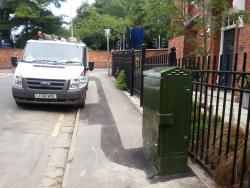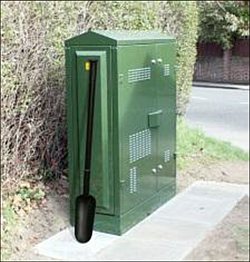Openreach’s sub-contractors may not all be so bad after all.
I finally had BT Infinity installed a few weeks ago. Having watched the installation of Huawei DSLAM at the end of the road some time before that with much anticipation, I pondered how badly BT Openreach and its subcontractors would botch the job and ruin the frontage to our community, while also yearning to finally break beyond the 14 Mbps glass ceiling I have endured for 3 years.
With regular broadband I have been fortunate, being on brand new copper and only 100 yards from the primary connection point with a short run thereafter to the exchange; thus I’ve always had the top end of the advertised broadband speed. My problem was with up, though, not down. Regular readers will know I am a home-based professional nomad, and as such uploading documents to file servers etc. in a timely manner is rather important. 1 or 2 Mbps just doesn’t cut it.
I had done my research and knew that an Openreach engineer would have to visit to install Infinity II. Forums and blogs were full of details about cable models and data extension kits and Openreach engineers having to run new cables through peoples’ houses. In this industry, we would hardly trust them to dress themselves in the morning half the time let alone undertake works in our nicely decorated hallways. I was scared.
Turns out though that the BT Homehub 5 has an integrated cable modem, so that problem went away (and I note it has better in-house coverage for WiFi than its predecessors — I have been fortunate enough to have had a Homehub 2, 3 and 4 and a Businesshub 3 to play with — and it didn’t nerd up VoIP with SIP ALG either). Also, as the cabling in the house is only 3 years old and to modern standards, the engineer felt no need to run a new line or change face plates — useful as it is a large integrated one that includes TV aerial, satellite, etc. — and just plugged it in. The entire installation took about 20 minutes, including the jumpering in the PCP and DSLAM.
What struck me most about my Openreach install was that my neighbour was also having it done in the same installation slot. The engineer visited both premises and did what he had to do onsite, and then visited the PCP/DSLAM to do jumpering just once (i.e., he simultaneously did both jobs). Furthermore, he called me on my mobile from the PCP/DSLAM to check if it was working, thus negating the potential need for going back and forth. Turns out the sync speed is virtually the advertised 76Mbps up down and 19 Mbps down up, with the reality not far off (up is almost dead on, down hovers around 50/60 so far).
The engineer was a sub-contractor to BT Openreach, working for Kelly Communications. These sub-contractors are often derided for cherry picking easy jobs, making out that the customer wasn’t present when they were, so they can complete as many of the low-hanging fruit as possible to boost their profit margins.
I am not sure whether Openreach Direct Labour would’ve had the initiative to simultaneously perform two installations, thus, ultimately, reducing lead times and increasing customer satisfaction. I do know that Openreach Direct Labour, upon realising that there was insufficient copper in the ground between a PCP and the exchange to install a new line in a colleague’s home, had to get another engineer to pull it through and then that engineer couldn’t just provision the line, they had to get another one to do it (no doubt you can imagine how long that sorry saga took). If that job had been sub-contracted, I wonder whether it would’ve been done more efficiently and ultimately to a better level of customer satisfaction?
The incidents we have all endured at the hands of Openreach are many and would shock anyone. Anne Robinson and Watchdog even did a piece on it. Many of these incidents involve sub-contractors, however I think we are in danger of throwing out the baby with the bathwater here as clearly the profit incentive is doing some good in certain circumstances….. it may even work to overcome the inherent moral hazard in the way Openreach’s prices are calculated (i.e., the industry often pays for inefficiency, directly through the charge controls and indirectly through non-Openreach brand damage). Surely, the real challenge is how to we promote the positives and negate the negatives.
Lots of posts on t his site re BT engineering visits – check out this one on BT engineering visit lottery























